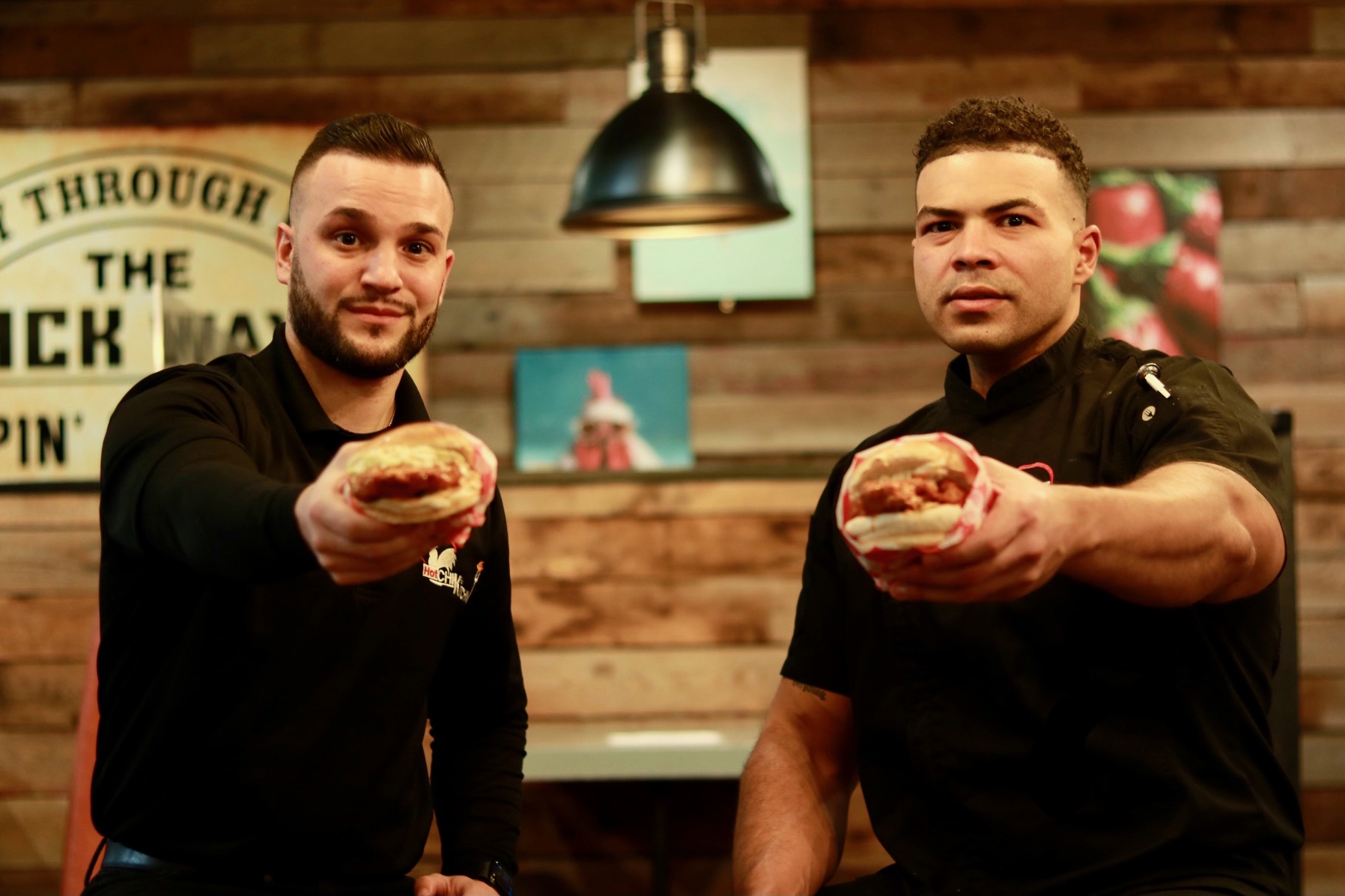Talk about Nashville-style food, and the list includes Nashville hot chicken. This inspired the establishment of Hot Chikn Kitchn in 2020. Co-founders Mike Sarago, Anthony Sarago, and Chef Freddy Gilmore opened their flagship restaurant in Woodbridge, Virginia, with two other locations in Virginia and franchises in New Jersey and Florida. Expansions are planned for the east coast and midwest regions.
The restaurant specializes in hot chicken tenders and sandwiches prepared with made-to-order spices featuring its signature premium hot sauces that infuse a different type of pepper.
Nashville hot chicken is traditionally a piece of fried chicken, bone-in or no bone, with a spicy dry rub, then either dipped or basted with another layer of oil. Hot Chikn Kitchn created its own hot chicken by cooking it in oil, removing it from the pan, fresh and hot, and dipping it into its specialty glaze. There are four different heat levels in the sauce—base, afterburner, angry hot, and medic.
The base sauce featuring the lowest heat level is a basic sauce with sweet and tangy ingredients. The base sauce is the base for the other sauces with higher heat levels and different flavors.
During the pandemic, they witnessed many restaurants being forced to shut down. Chef Gilmore reviewed the costs and recognized that the cost of Hot Chikn Kitchn needed to be reduced. The menu was too extensive (similar to Cheesecake Factory), there were 10 specialty drinks featured and seven different desserts offered. The chef knew it would be too overwhelming for the customer coming in for a different experience.
He created a menu offering eight different menu items using the ingredients being purchased and created excellent dishes. Everything would pair well with various sauces, and the food would sell itself with excellent customer service and hospitality. His goal is to create a great customer experience and even change a customer’s mood by eating in the restaurant.
In fact, this was one of the strategies used by Chef Gilmore when he read The Food and Beverage Magazine Guide to Restaurant Success: The Proven Process for Starting Any Restaurant Business from Scratch to Success written by Food and Beverage magazine publisher Michael Politz.
“This book is phenomenal. I can’t thank Michael enough for talking to me when I was setting up the kitchen,” says Chef Gilmore. “I read the book and broke down every chapter to see what I could learn and apply to my business. When I read about developing a menu in Chapter Four, it made so much sense, and I had to reach out to Michael to thank him for this invaluable knowledge. To share his wealth of knowledge in the printed word that any reader can understand is so incredible and generous of him.”
In Chapter Five, “Your Restaurant is a Stage,” Chef Gilmore called his restaurant an arena that has to be ready for the fans (customers) with the players (staff and management). They feature an open kitchen so people can see their food being prepared and cooked. Chef Gilmore understands from the book that everything needs to be in place, and everyone needs to work cleanly with a professional attitude and good manners. Restauranteurs and operators need to realize that customers see and hear everything that goes on, even behind closed doors and walls, if it is brought out into the front of house.
Another element of Chapter Five, hiring, really resonated with the chef. He knows that it is about the right fit, especially management. However, he learned that terminating (firing) a staff person or manager was just as important, especially if the person is toxic and needs to be removed.
Chapter Six, “The Main Course,” explains the need for consistency with every dish. The chef discovered that keep the recipes easy to duplicate and offer a few excellent plates instead of too many mediocre ones. “The book taught me that I had to execute the same dish the same way every single time it is served. It was such an eye-opener. I knew I had to train my prep staff, fry cook, and line cooks how to prepare each meal and do it so that they could duplicate it without me standing there to supervise. I discovered from the book that it had to be done so that a 16-year-old can understand and prepare it the same as a master chef.”
Chapter Seven, “Learn from Reviews and Opinions,” blew the chef away. “I will open this book up when I am having a hard day and understand not to take reviews personally. I had to learn to embrace a 1-star review and celebrate a 5-star review. This chapter also taught me that this is my problem to fix, not my staff’s problem, and that is what we did.”
Chef Gilmore appreciated Chapter Eight, “Getting the Word Out That You Are Open for Business,” since most restaurants are successful by word-of-mouth. “I tell everyone I own a restaurant, not for the clout, but to promote my business and get potential customers. You can’t be scared or embarrassed to talk about what you created. You need to invite people to try your food, and Chapter Eight helped me with this.”
One of the best chapters for the chef was Chapter Nine when Politz explained how Politz’s failure became his biggest success in opening a restaurant. “I have to admit; I have failed a lot in my life, but I have never failed. I know it is an oxymoron, but true. I have learned from every failure, and so has Michael [Politz]. Chapter Nine opened my mind: we need to fail because that is the only way we will learn and get back up.”
“Michael wrote the golden rule in Chapter 10 to treat everyone how you want to be treated. I applied the golden rule to my staff and managers, showing them my appreciation. I can’t come in and just work them to death and still expect them to treat our customers and clientele the right way. If I treat my staff using the golden rule, hospitality will shower the customers with excellent service and wonderful food.”
When the partners, including Chef Gilmore, strategized about expansion, Politz’s book explained the difference between franchising and licensing. While it is more complex to lay the foundation for franchising, the partners would maintain control, while with licensing, they lose control of their brand. “The information Michael gave us in his book was invaluable for us to make the right decisions about expanding our chain.”
As for his tag lines, “Unity Through Food” expresses his motto for the restaurant, and “Food is Love” is his motto.
“Unity Through Food means that the restaurant is our vessel to bring people together,” explains Chef Gilmore. “It is all-inclusive with all walks of life coming to the restaurant no matter gender, race, or creed, whether you are on the left, right, or middle. I want everyone who comes to eat with us to enjoy great food and have a conversation with other people that they might not meet elsewhere. We unite people with our food.”
As for his philosophy, “I truly, firmly believe that every human being needs to be loved, whether it is a family, in a relationship, parents, siblings, or friends. Also, as a proven fact, every human being needs to eat. I put it together that Food is Love. I show my love through cooking, which is how I get my love. I love to watch my customers eat my food and smile, showing me how much they are enjoying it.”
Born and raised in New Jersey, Chef Gilmore was inspired at a very young age to cook. His great-grandfather owned a diner in the 1950s. His example of how he treated his family, staff, and customers motivated Chef Gilmore to work in the restaurant industry.
“I understood that a restaurant offered food that kept people alive, paid the utility bills, and took care of a family with housing, clothing, and meals,” he says. “My great-grandfather did anything he could for the community and served the people. This is exactly how we operate Hot Chikn Kitchn.”
He would meet his partners through his brother, which was a perfect fit for everyone to open Hot Chikn Kitchn. Mike and Anthony were looking for a chef, and Chef Gilmore wanted to expand into becoming a restauranteur.
The chain has partnered with Dave Wood, Chief Strategic Officer for Hot Chikn Kitchn. Todd Kirby was recently brought into the company as its Franchise Development Partner, who will focus on finding franchise partners to meet the company’s stated goal of 200 new locations in the next three years.
Qualities for successful franchisees are people who can manage staff, vendors, customers, and money, as well as operate front and back of house. Hot Chikn Kitchn will deliver products to the restaurant with fresh chicken, batter, and sauces, so all guesswork is removed, and a chef on staff is not required. Also, franchisees are people who will follow its core beliefs, including “bringing hospitality back to the hospitality industry.” Hot Chikn Kitchn offers a philosophy that “we want to build a partnership and relationship since we work for our franchisees.”
In addition to in-restaurant dining, Hot Chikn Kitchn also offers online ordering for pickup, delivery through third-party partners, and catering. For more information, visit www.hotchiknkitchn.com. To inquire about franchising opportunities, email franchise@eatHCK.com.
Read more: Halloween ‘Cash for Candy’: Support Troops, Earn Treats








